- Home
- David Downing
Masaryk Station (John Russell) Page 30
Masaryk Station (John Russell) Read online
Page 30
One held them at gunpoint while the other patted them down, and then ordered them on to the sofa while his comrade searched Rosa and Effi’s bags. A grunt of minor triumph accompanied his discovery of the newly-purchased handgun.
Russell was noticing signs of a search. Things had been moved and then put back, but not quite in the same position. They’d been looking for the film.
‘Do these two speak Russian?’ the obvious Russian man asked him, waving his gun in Effi and Rosa’s general direction.
Russell could see no point in lying. ‘No,’ he said.
This seemed to please his interrogator. ‘Well, where is it?’ he asked.
‘Where’s what?’
The man smiled. ‘If you waste our time you’ll only make it harder on yourself and your family. We know you have it, and if you won’t tell us where it is, we shall take you all to our sector and question you until you do. And once we have you over there, I can’t see what reason we’d have for ever bringing you back.’
Listening, Russell knew he had no choice. His first thought when the two men appeared had been that Shchepkin had badly misread his boss, but this Russian’s repeated use of ‘it’ suggested otherwise. If these men believed there was only one copy, then they hadn’t come from Beria. GRU most likely, Soviet Military Intelligence. But how had they found out about the film? There was one obvious candidate. ‘How is Merzhanov?’ Russell asked.
‘He’s dead.’
‘And the woman who was with him?’
‘The same. You admit, then, that they gave you the film?’
‘Yes.’
‘Where is it?’
‘If I tell you, what’s to stop you killing us, too?’
‘If you give us the film, why would we do that?’
He was almost certainly lying, but as Russell had noticed in a similar situation three years earlier, hope really did spring eternal. And sometimes with reason.
The Russian added a real stick to his dubious carrot: ‘But if you don’t tell us where it is, I shall hurt your wife or daughter. And if that doesn’t convince you, then I shall kill one of them.’
As Russell looked at Effi and Rosa, it felt like ice was forming in his brain. ‘I buried it in the forest,’ he told the Russian.
‘Which one?’
‘The Grunewald,’ he said, noting the flicker in Effi’s eyes as she caught the word.
‘We will go there at once. My comrade will stay with the woman and girl as a guarantee of your behaviour.’
‘Can I explain that to them?’
‘Tell them to do as he says.’
Russell explained the situation to Effi, trying not to scare Rosa any more than she already was. There was no point in telling Effi to take any chance that arose—she would know that already—and for all he knew one of the Russians understood German.
Effi squeezed his hand and gave him an unconvincing smile. The thought that he might never see her again seemed utterly ridiculous.
As he and the Russian walked down the stairs, Russell tried to think through the implications. The GRU wanted the tape to use against Beria, but they wouldn’t want the world to know about it—only the West would gain from that. This was both good news and bad news. Good because the Americans would remain in the dark; bad because any Westerners who knew about the film would need to be silenced.
The bad news seemed to render the good news redundant.
The car, a Maybach SW42, was around the corner. ‘You drive,’ the Russian said.
It wasn’t a car he’d driven before, but after grinding his way down to Ku’damm, he finally got the hang of the gear stick. The boulevard was busy, and when a red light held them halfway down, he thought about leaning his head out of the window, and telling the world he was being abducted. What would the Russian do—shoot him?
He probably would. And then shove the body on to the street and drive off. There would be plenty of witnesses, but none would lift a finger to help Russell, any more than they had in the ’30s, when the brownshirts had picked on some hapless Jew.
And what was the point of fighting back now? Effi and Rosa should be safe until the Russians had the film in their hands. It was better to wait, and take the chance he’d planned for.
He drove on, half-blinded by the setting sun, crossing the Ringbahn by Halensee Station, and following the winding Königs Allee to the Grunewald’s eastern perimeter. Private vehicles weren’t permitted beyond the lightless Hundekehle Restaurant, but Russell drove on down the access road. There seemed little chance of their being challenged at this hour, and he had reasons of his own for not wanting too long a walk after he had dug up the film.
They only passed one couple, who gave them a dirty look but kept on walking. The twosome had taken them for warmer brüder, Russell thought, men who were out for an illegal fuck in the forest.
A minute or so later he brought the car to a halt. As far as he could tell in the fading light, they’d reached the nearest point on the road to where he’d buried the film.
They both got out.
‘How far is it?’ the Russian asked.
‘A few minutes. No more.’
They started walking, Russell showing the way. Under the eaves it was darker still, but he found the clearing without any problem. ‘It’s over here,’ he said, walking towards the tree.
‘Where?’
‘Here,’ Russell told him, sinking to his knees. This was the moment he feared, when the Russian might order him aside and do the digging himself.
He didn’t.
Russell took his time scooping out the still-loose earth with his hands, and just as his questing fingers made contact with metal, the Russian leaned over his shoulder to see what was happening.
‘You’re in my light,’ Russell told him.
‘Well, hurry up,’ the Russian said, stepping back a pace.
Uttering a short and very silent prayer that internment hadn’t disabled the gun, Russell curved his hand around the grip, inserted one finger ahead of the trigger, and jerking it free of its temporary grave, opened fire at point-blank range.
The crack echoed through the forest, scattering loudly cawing birds up into the night sky.
The Russian was still moving, whimpering softly. The eyes looking up at Russell were those of a small boy.
He raised the gun, steeled his heart, and fired again.
When the door closed behind Russell and his escort, Effi’s first impulse was to have a good weep. But Rosa had beaten her to it—Effi’s daughter was sobbing in eerie silence, the way her real mother had taught her, when they lived in a Christian friend’s garden shed, and the Gestapo’s main hobby was seeking out hidden Jews.
She took the girl in her arms and tried to hide the hatred she was felt for their Russian guard. After drawing the curtains he had sat down opposite them, lit a cigarette, and held them in his gaze. His narrow eyes made Effi think of Mongols, and cruelty, but so far at least he’d shown no sign of murdering them.
Effi told herself there was no reason for despair, not yet anyway. When Russell had told her about his brainstorm—the death-camp escapee’s advice and the gun he’d buried with the film—she’d thought it all a touch absurd, but it might well save their lives. It would be almost dark by the time they reached the Grunewald, which would surely improve his chances. She had to believe he’d come back.
What would happen when he did? What would he do? Just knock on the door and shoot this staring Russian when he opened it?
But she didn’t think the Russian would be so obliging. Either he and his partner would have a signature knock, like she and Ali had had in the war; or he’d wait to hear the other man’s voice.
And if he didn’t hear it, then what? He would probably assume it was a friend or a neighbour who had knocked, and send her to answer it. And he would hold on to Rosa just in case. If Russell just burst in shooting, the girl might be killed in the crossfire.
But Russell would already have worked all that out, Effi knew. T
he reason he’d taken the death-camp escapee’s advice to heart so readily was that it chimed so well with his own way of doing things.
So, what would he do? And how could she help them all survive it?
It had taken Ströhm until late afternoon to get his hands on the full text of the Cominform Resolution, and after leaving work he stopped at a bar on Potsdamer Strasse to read the whole thing through. His sense of outrage increased as he did so. The Yugoslavs were accused of ‘left deviationism’ one moment, and then ‘supporting capitalist elements’—a rightist deviation—the next. The Yugoslavs were criticised for their ‘hostile attitude to the Soviet Union’, when everyone knew they had bent over backwards in praise of Stalin; and for creating a ‘military bureaucratic system’, which was too ironic to be true. Ströhm didn’t see how anyone could believe such rubbish. But all the East European parties, including his own, had put their signatures to the Resolution and its principal demand, that the current Yugoslav leadership either change course or face instant removal.
Ströhm ordered another beer and read the Resolution through again, seeking even the faintest echo of the movement he had joined and served. There was none. It was the work of bullies looking after their own.
He was tempted to get really drunk, but told himself not to be so pathetic. Ströhm knew he needed to be strong, to look the truth in the face without anger or self-pity. He needed to talk to someone.
His first thought was Trenkel, whom he knew shared much the same doubts, but what was the point of talking to a mirror? John Russell would be better, Ströhm decided. Russell had left the Party a long time ago, but he understood why others had stayed.
Ströhm walked out to the wretched car, glad for once that he didn’t have to walk, and clambered in behind the wheel. He felt sober enough to drive.
Ten minutes later he pulled up outside the building on Carmer Strasse. Darkness was beginning to fall, and he wondered if it was too late for a visit—he should have called them first. But the living-room curtains were rimmed with light, suggesting they hadn’t yet gone to bed. And it wasn’t that often that a friend mislaid his purpose in life. They would make allowances.
He ascended the stairs and knocked on the door to their apartment.
No one came to answer.
Ströhm heard nothing when he put his ear to the door, but perhaps they were in the other room. After some hesitation he tried again.
This time there were footsteps.
The door half-opened, revealing Effi. He was still smiling apologetically when she said, ‘I’m sorry, Kurt, but I can’t talk to you now,’ and firmly closed it in his face.
He stared at the door. Kurt? Had she been drinking too?
Ströhm raised his hand to knock again, then let it fall. After standing there for a few moments, he walked downstairs and climbed back into his car. Something was wrong, he thought. But what?
As he turned to look up at the flat, a curtain twitched. Someone was making sure he went.
He obliged whomever it was, driving down to Steinplatz and around the triangular block, pulling over on Kant Strasse where he couldn’t be seen from the flat. Lighting a cigarette, he wondered whether to call the police.
Ku’damm was still busy as Russell drove back towards Carmer Strasse. He’d been running through options since leaving the Grunewald, but still hadn’t found one that seemed at all promising. The moment he stepped through the apartment door without his escort he would be putting the others’ lives at risk. The other Russian might just open fire, with God only knew what results; but if the guard’s gun was already at Rosa or Effi’s head, he’d have no need to gamble. The threat would force Russell to drop his gun, and they could all be shot with impunity.
But sooner or later he had to go through that door. He needed a diversion of some sort, but short of shouting ‘fire’ and hoping for the best, he couldn’t think of one.
Driving around Savigny Platz he wondered where he should stop. Since it no longer mattered who saw the car, the Russian inside would expect him to leave it out front, but he didn’t want to advertise his return until he knew what he meant to do. He couldn’t leave it too long—that would make the Russian nervous—but he had to have some sort of plan.
There was a Horch 851 in the old spot, another Soviet favourite. Had the man in the flat been joined by colleagues? And, if so, what chance did he have of saving Effi and Rosa?
As Russell eased past the other car, he saw there was someone behind the wheel.
It was Gerhard Ströhm, staring straight back at him.
What was he doing there? Russell wondered, as he pulled the Maybach over. Surely Ströhm couldn’t be with the Russians.
He watched Ströhm get out of his car, walk forward, open the passenger door to Russell’s car, and plunk himself down in the adjacent seat.
‘I’ve just been up to your flat,’ Ströhm said.
Russell’s heart missed a beat. ‘And?’
‘Effi opened the door, called me Kurt, and shut it again.’ He looked enquiringly at Russell.
‘Ah.’ He had to tell Ströhm something, but what? The truth? Russell had always liked the man—they’d become good friends over the last couple of years—but Ströhm was still a high-ranking KPD functionary, part of the new establishment.
Russell decided he would say that he and Effi had just had a row, and she was in a bad mood.
He turned to Ströhm, opened his mouth, and then closed it again. To hell with it, he thought. This man had gone way out on a limb for him in 1941, and again in 1945. If he couldn’t trust Ströhm, then what was the point?
‘When Effi opened the door to you,’ Russell told him, ‘there was a Russian in the other room holding Rosa at gunpoint.’
Ströhm blinked. ‘Why?’
‘There were two of them waiting in the flat when we got back a couple of hours ago. They want something from me. This,’ he added, pulling the tin box out from under his seat. ‘It’s a reel of film. I’d buried it in the Grunewald, and the other Russian drove me out to dig it up.’
‘What’s on it?’
‘You don’t want to know.’ He doubted that Ströhm would be brushed off so easily, but his friend had an even more pertinent question.
‘Where’s the other Russian?’
‘In the boot.’
Ströhm almost burst out laughing. It wasn’t the slightest bit funny of course, but he’d been harbouring homicidal thoughts about the Soviets for most of the day. ‘MGB, I presume?’
‘GRU, I think, actually. But right now it doesn’t seem to matter that much.’
‘No. Well, the obvious thing to do is call the police.’
Ströhm sounded as unconvinced by that idea as Russell was.
‘There are problems with that idea.’
‘The man in the boot.’
‘Apart from him, unfortunately. Look, Gerhard, with that bastard holding Effi and Rosa I don’t have time to explain what this is all about. I do know that the police would worry a lot more about the consequences of killing a Russian official than they would about Effi and Rosa’s safety.’
‘I do have some influence.’
‘I know, but anything like that would take an age, and Ivan up there is already wondering why his buddy and I are taking so long. Help me think up some sort of diversion.’
‘Use me.’
‘What?’
‘I’ll go up there and force my way in. He’s not going to shoot a candidate member of the KPD Central Committee.’
‘They planned to kill us all once they had the film. I’m sure he’d apologise profusely after killing you, but that would be the only difference.’
‘He won’t shoot me out of hand,’ Ströhm insisted. ‘Not if he thinks I’m there on Party business. He’ll wait for his partner before taking a decision like that.’
‘I’m not convinced.’
‘What else do you have?’
Russell tapped his fingers on either side of the steering wheel. ‘Nothing,’ he admi
tted.
‘Well, then.’
‘What’s your reason for turning up?’
‘The last time I talked to Effi, she was being pressured by the Soviet culture people. I could be an emissary from Tulpanov.’
Russell had a sudden inspiration. ‘No,’ he said, ‘I have a better idea. One that should save Rosa.’
Up in the flat, the Russian was still staring at Effi and Rosa through his veil of cigarette smoke. His partner had been gone for almost two hours now, but he didn’t seem concerned. Rosa had stopped crying, and was simply hugging her mother as tightly as she could, her blonde head pressed against Effi’s chest.
When the knock sounded on the door, the guard gestured Effi to answer it, and moved himself behind the sofa, his gun at Rosa’s neck.
As Effi opened the door, Ströhm breezily forced his way past her, talking in Russian. ‘Comrade,’ he said, ‘I know you’re in there.’
The Russian’s gun was pointing straight at him, and for a moment Ströhm thought he would shoot. ‘Our kommissariats have reached a mutual decision,’ he added quickly.
‘What kommissariat? Who are you?’
‘I’m sorry. My name is Ströhm. KPD Central Committee. And K-5 of course, though it doesn’t say that on my papers. May I?’ He reached in a hand before the Russian could say no, and brought out his Party accreditations.
The Russian studied the papers without moving his aim. ‘So this is who you are. What are you doing here?’
‘I’m here for the girl.’
‘The girl?’
‘You do know who she is?’
The Russian looked blank.
‘This is the girl who drew the famous picture of the Red Army soldier on Bismarck Strasse. You must know it.’
‘Of course.’
‘Well your culture people have plans for her. And your department has agreed that she be spared.’
‘We were told no witnesses.’

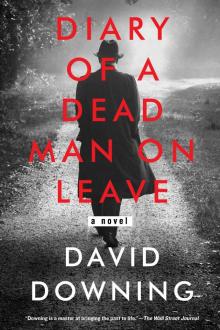 Diary of a Dead Man on Leave
Diary of a Dead Man on Leave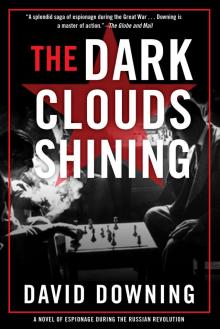 The Dark Clouds Shining
The Dark Clouds Shining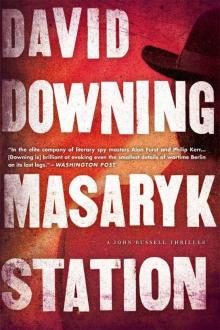 Masaryk Station (John Russell)
Masaryk Station (John Russell)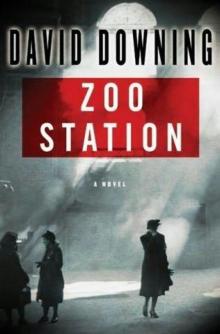 Zoo Stationee
Zoo Stationee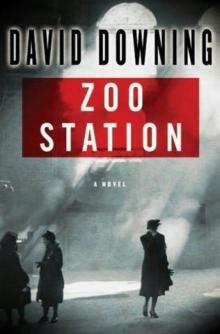 Zoo Station jr-1
Zoo Station jr-1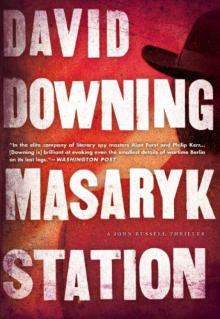 Masaryk Station
Masaryk Station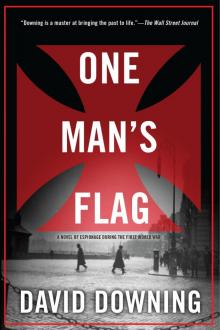 One Man's Flag
One Man's Flag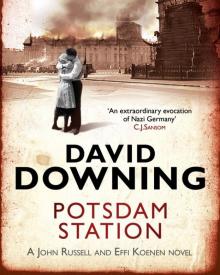 Potsdam Station jr-4
Potsdam Station jr-4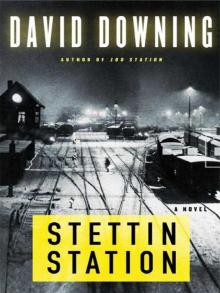 Stattin Station jr-3
Stattin Station jr-3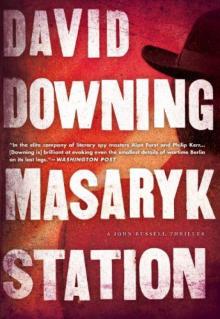 Masaryk Station jr-6
Masaryk Station jr-6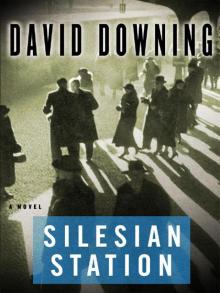 Silesian Station (2008) jr-2
Silesian Station (2008) jr-2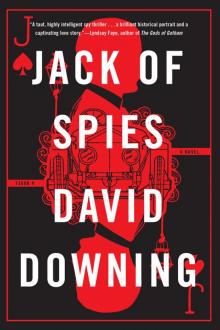 Jack of Spies
Jack of Spies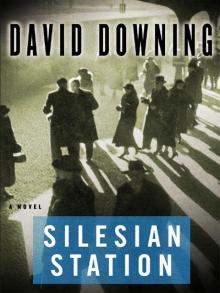 Silesian Station (2008)
Silesian Station (2008) The Moscow Option
The Moscow Option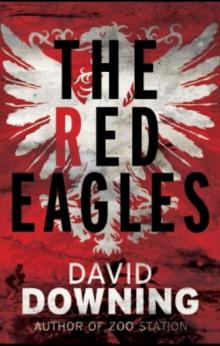 The Red Eagles
The Red Eagles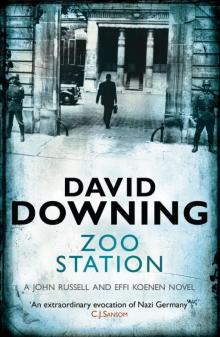 Zoo Station
Zoo Station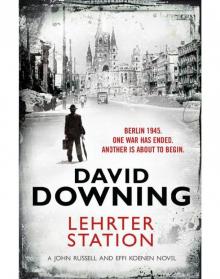 Lehrter Station
Lehrter Station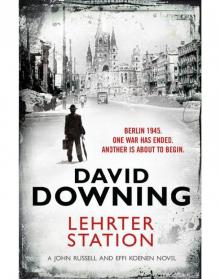 Lehrter Station jr-5
Lehrter Station jr-5